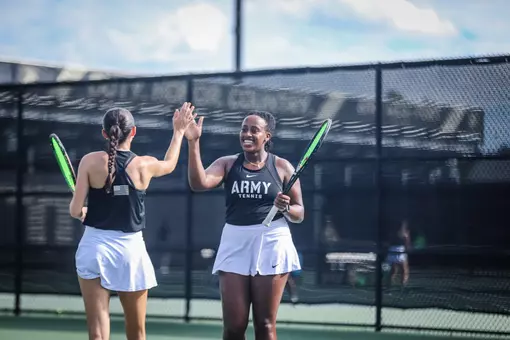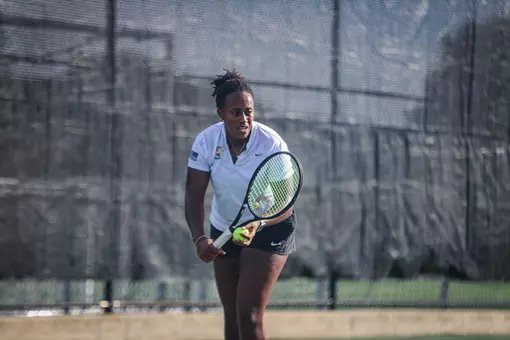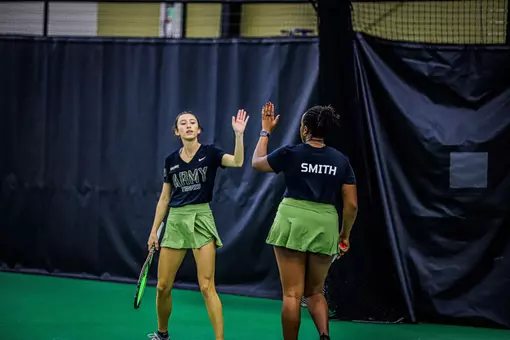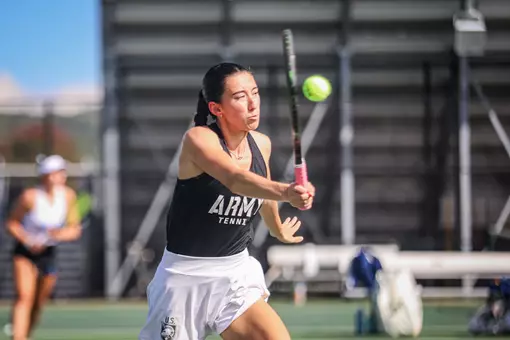Army West Point Athletics
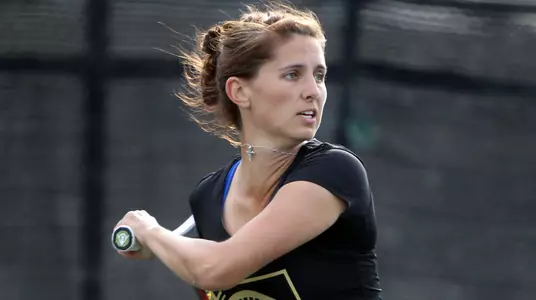
Feature Friday: Overcoming Pain
April 08, 2016 | Women's Tennis
Feature Friday highlights the tremendous personal stories our coaches and cadet-athletes have to share on a weekly basis. Each Friday, a new feature story will be prominently highlighted on GoArmyWestPoint.com. The features will include multi-media pieces, as well as written stories by media outlets and the Army West Point athletic communications staff.
There are too many scars to keep track of at this point.
That's the price Carolyn Pitman has had to pay playing the game of tennis. The constant strain on the body, the quick cutting, stretching the arms and legs to get the racket to an ever eluding ball, heavy swings, they all pay their price.
An ever expanding list that features multiple tibia fractures, a herniated disc, tendonitis in knees, elbow, and shoulder, back issues, and loss of feeling in her left (dominant) hand; a litany of issues for a 23-year old to go through with more surgeries on the way in the coming years.
Some people might cringe just reading that list.
Pitman took the bumps and bruises, the knives and the heartache, and became one of Army West Point's best tennis players. But it's a trail that was nearly never started.
Shocking in retrospect that Pitman ended up at Army after the way her first phone call with Black Knights head coach Paul Peck went the summer before her senior season of high school.
"I hung up on him," said Pitman. "My image of the Army was skewed. I didn't know what West Point was."
Peck was able to get the West Chester, Ohio, native back on the phone again and was able to ultimately convince her to meet with his graduate assistant at the time, Paige Ford.
"She's gorgeous," Pitman profoundly states as she recalls her first meeting with Ford in St. Louis, Mo., that summer. "My image of the Army completely changed after that and I realized there was more."
It is surprising Pitman even played tennis in the first place, given her mother's pedigree in another sport.
Kathleen Gammon, Pitman's mother, was a former volleyball player at Indiana and even had a stint playing for the U.S. Olympic team shortly while she initially got into coaching the sport, but admittedly says she was too short (5'8") to stick. She wound up as an assistant coach on the men's side at Illinois State under the legendary Don Shondell, who has the second-most wins in NCAA men's volleyball history, before spending four years as the head coach at Cincinnati.
Pitman, however, was not aware of any of this until stumbling upon old trophies and a bright blue velvet uniform with red "USA" letters stitched across the chest while unpacking boxes one day.
"Why the heck did she not teach me?" Pitman asks while reminiscing the moment and chuckling about the thought of what could've been in another sport.
The reason she had gone unaware for such a prolonged period was her mother did not want to force her to play a sport simply because she had done so.
"For me, I fell in love with the sport of volleyball after playing a lot of different sports," says Gammon who was a basketball player, swimmer, and rode horses growing up in addition to volleyball. "My parents never pushed me to any one sport and I didn't want to push my kids."
Gammon wanted her to find a sport in which she loved because she believes passion for your sport is just as important as the mental or physical attributes.
"Plus, tennis season completely conflicts with volleyball," Gammon jokes.
Although each chose different sports to pursue, the similarities in personality among the two are uncanny.
"My father summed it up to me once," Gammon says. "The first time he was out playing basketball with my daughter, he immediately recognized her tenacity. He was convinced right away that we had the same spirit."
Peck states that, "(Pitman) definitely had it in her genes."
As the old adage goes, the apple doesn't fall far from the tree.
Pitman's private tennis coach growing up, Brian Peters, saw her competitiveness from a young age.
"Her and her brother started coming down hitting just for fun," Peters recollects. "The more they started playing, the more they got into."
Peters saw a drive in her and the ferocity she had on the court. Pitman would be at weekday workouts with Peters before the crack of dawn in order to try and improve her game.
"She's the nicest person on the planet off the court but when she gets on the court, she flips a switch," says Peck.
As Pitman began to harness her game, she began to hit the ball with great velocity. Peters developed a fitting nickname for her.
"The more aggressive that she got, she really started to rip the ball. I rarely called her Carolyn. Mainly 'The Heater.'"
Peck has his own nickname for her that she now wears with as a bridge of pride stamped across on her shoes; Icepick.
"She is really direct," says Peck. "There is no gray area with her. She knows what she wants and goes after it. She's a competitor and doesn't like to lose."
Peck said that it was apparent during her freshman season that Pitman was going to become an important part of the line-up. After battling through multiple stress fractures in each tibia during the fall season, she came on in the second half of the year and posted a perfect 5-0 conference record in singles and doubles and was named to the All-Patriot League Second Team. That was despite a kidney infection that hospitalized her for a week at one point.
Pitman began to really find her stride as a sophomore as she improved from the all-conference second team to the first team. During the 2013-14 campaign, she tallied 39 doubles wins, the most in Academy history for a single-season. She went 39-3 on the year and 23-0 with her partner Jamila Paul, the only perfect duo in West Point history. In singles, she boasted a 21-8 record, playing every match in the top two singles flights.
Perhaps it wasn't just improving as a player that aided Pitman that year, but also the fact that she stayed healthy, or at least relatively for her, as she only suffered a stress fracture in her tibia late in the season. True to character, she played through that injury in the Patriot League Championships.
Then came a junior season riddled with injuries. Doctors discovered that she had a herniated disc. It caused Pitman to have shooting nerve pains below her waist, causing a loss of feeling in her legs.
She battled through the pain, posting a 17-10 record in singles, the second-most singles wins on the team, and went 20-11 in doubles. This was good enough for her to repeat All-Patriot First Team honors. All this at far below 100 percent.
"For her to do that in that kind of environment says a lot about her character and determination," said Peters, who recently served as an assistant coach at Akron in addition to working as a personal coach. "It shows me that she can fight. You're out there by yourself. You have to set the pain aside and go win and you have to do it yourself. You have to overcome the pain."
Blocking out mental distractions is key. Pitman says with a snap of her fingers, "you can crack at any moment."
"You're literally stuck in your own head."
Some of the players Pitman has faced take the mental part of the game to another level with attempts to trash talk to her. She's had girls call her inappropriate names in other languages, fans heckling her, and even a girl in high school attempting to get her kicked off the team by proclaiming that she was pregnant.
"That's the kind of stuff you deal with."
Now in her senior season, Pitman continues to battle the tendonitis in her left elbow and shoulder, back issues, and had to go under the knife for kidney relocation surgery. Yet the wins continue to pile up.
In singles, Pitman now ranks tied for 8th all-time with 69 victories, accumulating a 15-5 record this season. She has won 19 career matches in the top singles flight, placing her seventh in Black Knights history for career wins at number one.
With a victory on March 5, 2016, she became only the second player in Academy history to reach 100 career doubles wins. In spring doubles matches, she has been victorious in 54 of her last 60 matches. Overall, her doubles record now stands at 103-28 and she possesses an even more astonishing 66-11 spring doubles record. Pitman is currently 17-0 with freshman Kirby Einck and states that "those 100-plus wins are nothing without my partners."
"We didn't go into this thinking 'let's break records,'" says Gammon. "She is doing great because she wants to be great. I'm very proud of her."
Peck laughs off that first call because of the bond the two have now and the wins that have come as a result. He says Pitman is one of the top three players he has coached at Army over his 20-plus seasons. She holds a perfect record against archrival Navy in her career (6-0 singles, 5-0 doubles). They will knock on wood out of superstition if you bring it up to either of them, but Peck sees a Michael Jordan mentality within Pitman, that she wants the task of making a play when her team needs it the most in the biggest matches.
"She's got the confidence to take the big shot," says Peck. "She doesn't run away from it, she thrives in it."
The records don't even begin to paint the entire picture of who Carolyn Pitman is. She displays a high tennis acumen on the court, coupled with a powerful swing, and long legs and arms that help her cover much of the court in a flash, but that is still just a small part of it.
It is Pitman's leadership, her resiliency to fight through the hardships, and to overcome mounting adversity to find a way not only to win, but to finish the day with a smile on her face that most accurately defines her as a person.
"I was always taught that somebody has it worse than you," says Pitman. "I can't complain. Does it suck at times? Yes but it makes you stronger in the long run."
You can follow the on Army women's tennis program at GoArmyWestPoint.com or follow @ArmyWP_WTennis on Twitter.
Click here to read previous Feature Friday stories.
There are too many scars to keep track of at this point.
That's the price Carolyn Pitman has had to pay playing the game of tennis. The constant strain on the body, the quick cutting, stretching the arms and legs to get the racket to an ever eluding ball, heavy swings, they all pay their price.
An ever expanding list that features multiple tibia fractures, a herniated disc, tendonitis in knees, elbow, and shoulder, back issues, and loss of feeling in her left (dominant) hand; a litany of issues for a 23-year old to go through with more surgeries on the way in the coming years.
Some people might cringe just reading that list.
Pitman took the bumps and bruises, the knives and the heartache, and became one of Army West Point's best tennis players. But it's a trail that was nearly never started.
Shocking in retrospect that Pitman ended up at Army after the way her first phone call with Black Knights head coach Paul Peck went the summer before her senior season of high school.
"I hung up on him," said Pitman. "My image of the Army was skewed. I didn't know what West Point was."
Peck was able to get the West Chester, Ohio, native back on the phone again and was able to ultimately convince her to meet with his graduate assistant at the time, Paige Ford.
"She's gorgeous," Pitman profoundly states as she recalls her first meeting with Ford in St. Louis, Mo., that summer. "My image of the Army completely changed after that and I realized there was more."
It is surprising Pitman even played tennis in the first place, given her mother's pedigree in another sport.
Kathleen Gammon, Pitman's mother, was a former volleyball player at Indiana and even had a stint playing for the U.S. Olympic team shortly while she initially got into coaching the sport, but admittedly says she was too short (5'8") to stick. She wound up as an assistant coach on the men's side at Illinois State under the legendary Don Shondell, who has the second-most wins in NCAA men's volleyball history, before spending four years as the head coach at Cincinnati.
Pitman, however, was not aware of any of this until stumbling upon old trophies and a bright blue velvet uniform with red "USA" letters stitched across the chest while unpacking boxes one day.
"Why the heck did she not teach me?" Pitman asks while reminiscing the moment and chuckling about the thought of what could've been in another sport.
The reason she had gone unaware for such a prolonged period was her mother did not want to force her to play a sport simply because she had done so.
"For me, I fell in love with the sport of volleyball after playing a lot of different sports," says Gammon who was a basketball player, swimmer, and rode horses growing up in addition to volleyball. "My parents never pushed me to any one sport and I didn't want to push my kids."
Gammon wanted her to find a sport in which she loved because she believes passion for your sport is just as important as the mental or physical attributes.
"Plus, tennis season completely conflicts with volleyball," Gammon jokes.
Although each chose different sports to pursue, the similarities in personality among the two are uncanny.
"My father summed it up to me once," Gammon says. "The first time he was out playing basketball with my daughter, he immediately recognized her tenacity. He was convinced right away that we had the same spirit."
Peck states that, "(Pitman) definitely had it in her genes."
As the old adage goes, the apple doesn't fall far from the tree.
Pitman's private tennis coach growing up, Brian Peters, saw her competitiveness from a young age.
"Her and her brother started coming down hitting just for fun," Peters recollects. "The more they started playing, the more they got into."
Peters saw a drive in her and the ferocity she had on the court. Pitman would be at weekday workouts with Peters before the crack of dawn in order to try and improve her game.
"She's the nicest person on the planet off the court but when she gets on the court, she flips a switch," says Peck.
As Pitman began to harness her game, she began to hit the ball with great velocity. Peters developed a fitting nickname for her.
"The more aggressive that she got, she really started to rip the ball. I rarely called her Carolyn. Mainly 'The Heater.'"
Peck has his own nickname for her that she now wears with as a bridge of pride stamped across on her shoes; Icepick.
"She is really direct," says Peck. "There is no gray area with her. She knows what she wants and goes after it. She's a competitor and doesn't like to lose."
Peck said that it was apparent during her freshman season that Pitman was going to become an important part of the line-up. After battling through multiple stress fractures in each tibia during the fall season, she came on in the second half of the year and posted a perfect 5-0 conference record in singles and doubles and was named to the All-Patriot League Second Team. That was despite a kidney infection that hospitalized her for a week at one point.
Pitman began to really find her stride as a sophomore as she improved from the all-conference second team to the first team. During the 2013-14 campaign, she tallied 39 doubles wins, the most in Academy history for a single-season. She went 39-3 on the year and 23-0 with her partner Jamila Paul, the only perfect duo in West Point history. In singles, she boasted a 21-8 record, playing every match in the top two singles flights.
Perhaps it wasn't just improving as a player that aided Pitman that year, but also the fact that she stayed healthy, or at least relatively for her, as she only suffered a stress fracture in her tibia late in the season. True to character, she played through that injury in the Patriot League Championships.
Then came a junior season riddled with injuries. Doctors discovered that she had a herniated disc. It caused Pitman to have shooting nerve pains below her waist, causing a loss of feeling in her legs.
She battled through the pain, posting a 17-10 record in singles, the second-most singles wins on the team, and went 20-11 in doubles. This was good enough for her to repeat All-Patriot First Team honors. All this at far below 100 percent.
"For her to do that in that kind of environment says a lot about her character and determination," said Peters, who recently served as an assistant coach at Akron in addition to working as a personal coach. "It shows me that she can fight. You're out there by yourself. You have to set the pain aside and go win and you have to do it yourself. You have to overcome the pain."
Blocking out mental distractions is key. Pitman says with a snap of her fingers, "you can crack at any moment."
"You're literally stuck in your own head."
Some of the players Pitman has faced take the mental part of the game to another level with attempts to trash talk to her. She's had girls call her inappropriate names in other languages, fans heckling her, and even a girl in high school attempting to get her kicked off the team by proclaiming that she was pregnant.
"That's the kind of stuff you deal with."
Now in her senior season, Pitman continues to battle the tendonitis in her left elbow and shoulder, back issues, and had to go under the knife for kidney relocation surgery. Yet the wins continue to pile up.
In singles, Pitman now ranks tied for 8th all-time with 69 victories, accumulating a 15-5 record this season. She has won 19 career matches in the top singles flight, placing her seventh in Black Knights history for career wins at number one.
With a victory on March 5, 2016, she became only the second player in Academy history to reach 100 career doubles wins. In spring doubles matches, she has been victorious in 54 of her last 60 matches. Overall, her doubles record now stands at 103-28 and she possesses an even more astonishing 66-11 spring doubles record. Pitman is currently 17-0 with freshman Kirby Einck and states that "those 100-plus wins are nothing without my partners."
"We didn't go into this thinking 'let's break records,'" says Gammon. "She is doing great because she wants to be great. I'm very proud of her."
Peck laughs off that first call because of the bond the two have now and the wins that have come as a result. He says Pitman is one of the top three players he has coached at Army over his 20-plus seasons. She holds a perfect record against archrival Navy in her career (6-0 singles, 5-0 doubles). They will knock on wood out of superstition if you bring it up to either of them, but Peck sees a Michael Jordan mentality within Pitman, that she wants the task of making a play when her team needs it the most in the biggest matches.
"She's got the confidence to take the big shot," says Peck. "She doesn't run away from it, she thrives in it."
The records don't even begin to paint the entire picture of who Carolyn Pitman is. She displays a high tennis acumen on the court, coupled with a powerful swing, and long legs and arms that help her cover much of the court in a flash, but that is still just a small part of it.
It is Pitman's leadership, her resiliency to fight through the hardships, and to overcome mounting adversity to find a way not only to win, but to finish the day with a smile on her face that most accurately defines her as a person.
"I was always taught that somebody has it worse than you," says Pitman. "I can't complain. Does it suck at times? Yes but it makes you stronger in the long run."
You can follow the on Army women's tennis program at GoArmyWestPoint.com or follow @ArmyWP_WTennis on Twitter.
Click here to read previous Feature Friday stories.
Players Mentioned
Army vs Bucknell Court 3
Saturday, April 15
Army vs Bucknell Court 1
Saturday, April 15
Army vs Navy - Courts 2, 4, 6
Saturday, April 01
Army vs Navy - Court 3
Saturday, April 01

